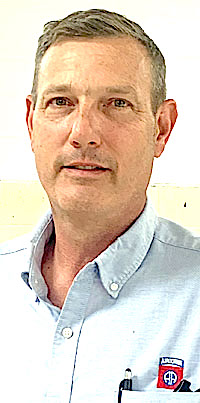![]()

For your convenience, we have installed the link below to make donations to this website easier. Now you can utilize your PayPal account or your credit card.
--------------
.

Guest
Column: Mayor Gerry Messmer![]()
“How do local governments work?”
The following is the 13th in a series of columns about life in Odessa written by Mayor Gerry Messmer. This one is different. It serves as a primer on local governments.
 ODESSA, Aug. 30, 2022 -- Since becoming the Mayor of Odessa I have had to spend a lot of time studying the system and understanding how local governments work to be able to perform my role to represent the residents as best as I can. Additionally, I have run into many, many people who clearly don’t understand local governments, and even local politicians who do not understand their role as an elected official.
ODESSA, Aug. 30, 2022 -- Since becoming the Mayor of Odessa I have had to spend a lot of time studying the system and understanding how local governments work to be able to perform my role to represent the residents as best as I can. Additionally, I have run into many, many people who clearly don’t understand local governments, and even local politicians who do not understand their role as an elected official.
Municipalities in New York State are all independent entities. There is not a “rank structure,” if you will. One entity does not report to another. For example, a village does not report to a town and a town does not report to a county. They all have separate legal basis and roles and responsibilities.
If you read Article IX, Local Governments, of the New York State Constitution, it outlines the establishment of, and authorities of local governments: "Powers and duties of legislature; home rule powers of local governments; statute of local governments. §2. (a) The legislature shall provide for the creation and organization of local governments in such manner as shall secure to them the rights, powers, privileges, and immunities granted to them by this constitution." Nowhere in the State Constitution will you see a “rank structure” because, again, each municipality is a separate entity.
Villages are run in accordance with Municipal Home Rule Law. A village is, specifically, a municipal corporation formed by the residents of an area in one or more towns to provide municipal services. Villages are New York’s form of incorporated city government. Village government is the government closest to the people, where residents know and directly communicate with their elected representatives.
Within Schuyler County, as we all know, we have villages, towns, and a county government. Mixed in with that is a county legislature, which was a Board of Supervisors until around 1972. The role of the legislators is to oversee operations of the county on a day-to-day basis and to represent the residents in their legislative districts, a role previously performed by the Supervisors.
Legislators should be the next level of “boots on the ground” elected officials talking to and listening to the residents/constituents of their district to find out what they can do to improve the quality of life and services by the county and even by the town or village, taking such information back to the respective boards.
They should attend village and town board meetings to understand the issues and then take them to the full legislature or appropriate committee for consideration, and then fight for them. As a resident, voter and who these folks work for and represent, you should be very concerned with their involvement in your community and know whether they attend local board meetings or not, how they vote and what their position is to help your community advance, especially before you cast your ballot to put them back in office. Remember, legislators are making over $10,000 a year PLUS medical benefits, at your expense, to represent you. So, the next time they want your support to seek re-election, ask them what they have done to impact your quality of life or to improve your community.
The County staff works for the County Legislature through the county administrator, who is hired to run the day-to-day operations of the county. From the county administrator job description in Local Law No. 3 of the year 1999: “The office will function as the agent of the legislature in supervising the daily operations of the county’s administrative matters with the primary goal of improving the general efficiency of the administration as consistent with all laws, rules and regulations.” This position has no authority outside of the county building and is totally inward focused on the staff and county staff functions.
Further, in Section 5, Powers and Duties, it specifically orients the limit of authority to internal only. Section 7, No Divestiture of Elected or Appointed Officials’ Power, states: “Nothing contained in this Local Law shall operate or be construed to divest or curtail the power of any elected or appointed official nor to constitute an impermissible delegation of legislative authority.”
Beyond the day-to-day operations of the county and their roles and responsibilities, the county should work with the villages and towns on fair and equitable allocation of economic development and infrastructure funds that have been made available by the county legislature. They should allocate these evenly, to be used at the discretion of the municipality, and not have “qualifications” to award them. Village and Town Boards are well suited to decide what is best for their constituents.
How about the position of Sheriff? The role of sheriff goes back to England, where sheriffs were usually appointed by the Crown and other officials to oversee the laws of the shire, or county. Duties included tax collection and running a local militia, also called the posse comitatus -- citizens who would moonlight as law enforcement.
In America, sheriffs play a particularly pivotal role where they serve as chief law enforcement officers. In many regions sheriffs still have wide jurisdiction and primary law enforcement responsibilities. Unlike police chiefs, who usually report to mayors or other elected officials, sheriffs have fewer checks on their power. Many sheriffs serve long stints in office, and some are in place for decades.
While the precise role of elected sheriffs varies from state to state, they have some duties in common, including overseeing local jails, transporting prisoners and pretrial detainees, and investigating crimes. Some even act as coroners, ruling over a person’s cause of death.
The only states that do not have local sheriffs are Alaska, Hawaii, and Connecticut, which rely on statewide law enforcement agencies.
Sheriffs are “sworn officers” who take oaths to support the state and U.S. Constitutions. The same oath being sworn by the sheriff when constitutionally elected to office is significant in the fact that he or she is the first line of defense in preserving the Constitutional rights of a citizen.
When we look at the Office of the Sheriff, combined with the historical powers held by that office, he stands as the upholder, defender, protector, and servant to the liberties of the people within the county. In addition to upholding the law, the sheriff is also charged with upholding the supreme law, the Constitution.
The law enforcement powers held by the sheriff supersede those of any agent, officer, elected official or employee from any level of government when in the jurisdiction of the county. The vertical separation of powers in the Constitution makes it clear that the power of the sheriff even supersedes the powers of the President.
Furthermore, it is this responsibility that grants a Sheriff the Constitutional authority to check and balance all levels of government within the jurisdiction of the County.
This is a position elected by the people of Schuyler County and thus, while representing and securing the county with law enforcement, does not report to the county legislature. The county does provide funding through taxes collected, but that does not give them authority over the sheriff.
The relationship between the Sheriff and the Legislature is a balancing act, but in the end, the sheriff must make decisions based on what is best for the residents that elected him/her to the position and based on the Constitution and Constitutional rights, not political favor. The voters (we the people) are the Sheriff's boss and employer.
I hope this, in some way, helped you better understand how local governments work and ultimately help you when it comes time to vote. Please remember to vote, it is our voice, and we should not take the right to vote for granted. Get involved with your community. Every village and town in Schuyler County needs folks to step up to the plate. Come, help make a difference, and think about running for office.
Photo in text: Odessa Mayor Gerry Messmer.
To see Mayor Messmer's first column, click here.
To see Mayor Messmer's second column, click here.
To see Mayor Messmer's third column, click here.
To see Mayor Messmer's fourth column, click here.
To see Mayor Messmer's fifth column, click here.
To see Mayor Messmer's sixth column, click here.
To see Mayor Messmer's seventh column, click here.
To see Mayor Messmer's eighth column, click here.
To see Mayor Messmer's ninth column, click here.
To see Mayor Messmer's tenth column, click here.
To see Mayor Messmer's eleventh column, click here.
To see Mayor Messmer's twelfth column, click here.
Charles Haeffner
P.O. Box 365
Odessa, New York 14869
